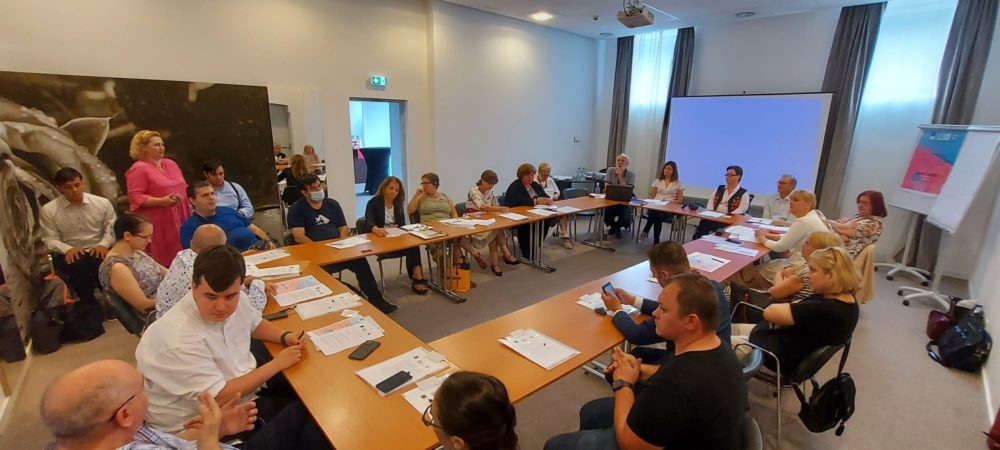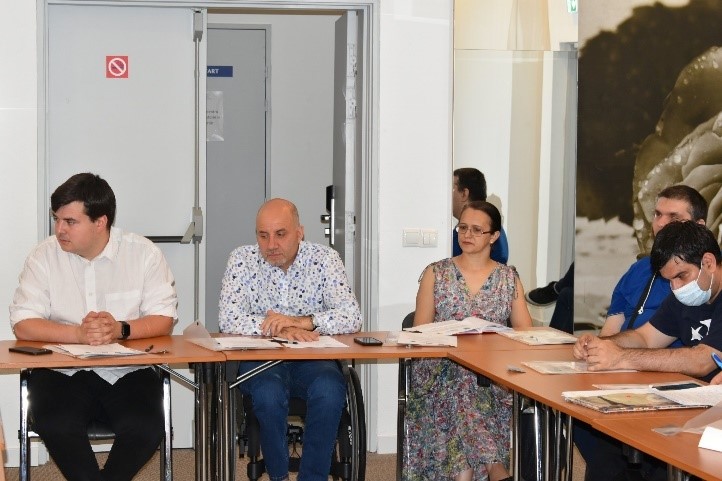Understanding the needs and solutions of young people with disabilities in Romania
As part of the ASCEND project, the National Disability Council of Romania (CNDR), in partnership with the RENINCO (The National Information and Cooperation Network for the integration into the community of children and youngsters and young people with special educational needs) has been implementing a research project that seeks to understand the barriers young people with disabilities face in the fields of education and employment, and what possible solutions can be provided.
What is the purpose of the study?
To identify the difficulties (barriers) faced by young people with disabilities, especially in the fields of education and employment as well as the ways in which the situation could be improved these young people from Romania. The study will also highlight the needs of young people with disabilities regarding communication with organizations of disabled people and their expectations of European policies and programs on disability.
Who is being interviewed?
193 responses to the questionnaire have been collected to date, out of which 75 were filled in with support from the field researchers. In addition, a number of 16 individual interviews were carried out, as well as a number of 5 focus groups, in four different areas of the country (Bucharest, Baia Mare, Botoșani, Ploiești).
Why do this research?
In Romania we know from experience, research and anecdotal evidence that there is a substantial gap for young people with disabilities in completing secondary school, entering tertiary education, completing tertiary education and segwaying to employment. It is during these late adolescent and early young adult years that the majority of young people living with disabilities are facing barriers which they are unable to pass.
As young children their parents are able to argue for their access and rights, but as these young adults move from 16 years to 26 years there is a gap in support: from the government, from education institutions, from NGOS, from job-seeking organizations, and from families themselves (due to legal age being a limitation). Obviously, the self-actualization and independent living are two substantial and vital goals to be achieved by PLWDs whenever possible. Young people living with disabilities need a specific kind of support during these years to ensure completion of studies, continuation of studies (if desired) and job-seeking and employment support. This is a universal truth. However, in Romania this lack of support is causing young people with disabilities to fall behind their potential. There are difficulties for many young people, up to the age of 35.
When does the study take place?
RENINCO Romania Association, in partnership with CNDR, began the research in June this year, and it will end on December 15, 2022.

What is the Ascend Project?
The Ascend Project is an EDF project focused on strengthening the capacity of associations of people with disabilities in Central and Eastern Europe, initiated and technically supported by the European Disability Forum (EDF) and financed by the Citi Foundation. It is being implemented in five countries by the national associations of people living with disabilities: Bulgaria, Czech Republic, Slovakia, Romania and Hungary.
Who is involved?
As part of the Ascend project, a Consultative Committee meeting was held in June with young people with disabilities being represented by Daniel Lolici and Neagu Octavian (ANSR Youth Branch) and Stan Andrei and Stan Ovidiu (Puzzle Association). Representatives from the Romanian Ministry of Education (Mrs. Secretary of State Antoaneta Bolchis), the National Authority for the Protection of the Rights of Persons with Disabilities (Mrs. Councilor Carmen Rotaru) and the National Authority for the Protection of Children’s Rights and Adoption (Mrs. Councilor Adina Codreș) as well as various representatives and disability experts participated from: the Romanian Deaf Association (ANSR), the Romanian Association for the Blind, the National Association for Children and Adults with AUTISM from Romania (ANCAAR), ASCHFR (The Association of Children with physical disabilities) The Puzzle Association (an association for helping parents and children with disabilities), The Association „Everything for you”. The Education Research Unit (UCE) within the National Center for Policy and Evaluation In Education (CNPEE) as well as Bucharest City Center for Educational Resources and Assistance (CMBRAE) were also represented.

Project Leads in Romania
Project leads in country, from RENINCO Association: Project manager: Traian Vrasmas, PhD, RENINCO and Ovidius Constanța University associate professor; Livius Manea, PhD, University of Bucharest (Professor Emeritus); and Ecaterina Vrasmas, PhD, University of Bucharest (Professor Emeritus) and RENINCO Association (President) at arr@reninco.ro or traianvrasmas@gmail.com
What are the next steps going to be?
RENINCO team has finalised the last interviews and focus-groups. The focus-groups which took place in late August and beginning of September, were also an opportunity for the dissemination of the project, as it had participants from various different organisations, in 4 areas of Romania.
The research is in the last stage of checking and cleaning the data captured via questionnaires. The data were transferred in a data base on SPSS, in order to make future data processing. The audio support and transcripts for 16 individual interviews and 5 focus-groups were collected, in order to be submitted to a qualitative analysis.
A draft report will then be developed for review and input by all the relevant stakeholders.
Then RENINCO, in partnership with CNDR and stakeholders will develop and implement a campaign (online and face to face advocacy) on the research findings and advocate for policy and programming changes to be made wherever applicable.
Training sessions having as participants youngsters with disabilities, parents and professionals will be held during October and November.
Project Lead at European Disability Forum
Phillipa Tucker, Coordinator for Central and Eastern Europe
phillipa.tucker@edf-feph.org
Photo credits
Peter Klaus Tontsch